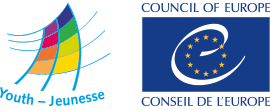Workshops
This was it!
Great ideas, plans, activities, tools and stories of campaigning – and the bad ones too!
On the second day of the conference (11 April), we will look further into the achievements and shortcomings in smaller thematic groups.
There will be 9 options available for this thematic space:
Human Rights Education – Learning from practices in education to counter and prevent hate speech
This working group will focus on the Human Rights Education aspect within the No Hate Speech Campaign. It will explore how Human Rights Education based on Compass, Compasito or Bookmarks was done in different educational settings and how the interaction was developed with schools, universities, other educational institutions, youth work centres and within non-formal education. The manual WE CAN! can also be addressed, but there is also a separate working group on using counter narratives in campaigning.
Media and Hate Speech – literacy, journalist training, guidelines and codes of conduct
This working group will explore how hate speech was addressed in mainstream media both online media outlets and traditional media. The group will share examples of dialogue initiatives with journalists, educational activities directed towards media literacy as well as development of common standards and code of conduct. What should be done next?
Campaigning with and for groups targeted by hate speech – from thematic approaches to coalitions to counter hate speech and protecting human rights for all
This working group will reflect on the campaigns’ success in mobilising young people to act in solidarity with those targeted by hate speech on all grounds. Campaigning on certain ground of discrimination and hate speech has involved more partners and different approaches, then others. What can be learned from the different approaches taken? Has the campaign established a broad coalition against hate speech and helped address multiply discrimination?
Sexism and Gender Equality online – the campaign’s contribution now and in the future
The working group will share examples of the work against sexism and towards gender equality within the campaign, identifying good practices and shortfalls. This group will explore the effects of the specific action days (8 March against online sexist hate speech, and IDAHOT) as well as the engagement of different partners and their work against sexist hate speech. In addition to this, the group also should identify which issues would need further attention in the work against hate speech in the future.
Youth work - Youth initiated, led and implemented activities at grass-roots level
How did the campaign reach out to young people locally where their online and offline lives happens? This working group will reflect on how working against hate speech online managed to become part of local youth work topics and activities. One of the possible ways to analyse the factors that contributed to effective youth work and youth initiatives is to look through the RMSOS model (Right, Means, Space, Opportunity and Support) and identify good practices based on it. The working group will also analyse how the work against hate speech online can continue to be part of the local youth work programmes and which strategies fit the most when approaching this topic.
Online Safety for and by youth - Approaches and practices to encourage online safe behaviour of children and youth
This working group will look if the campaign managed to raise awareness about online safety and security, promoting online safe behaviour by young people. Which tools and approaches were used to for example raise awareness about cyber-bullying, data protection and other cyber threats? How did the campaign cooperation with other stakeholders to improve Internet literacy and reduce violence and hate speech targeting children and youth?
The Internet and Hate Speech - Engaging with Internet businesses and others for effective addressing online hate speech
This working group will reflect on the engagement with Internet businesses and others stakeholders, such as NGO’s and governmental partners, through a multi-stakeholder approach or directly. What were the aims of the engagement? For example for support and partnerships on campaign activities, and/or to advocate for effective measures to address hate speech spread through their Internet services. What has been the effect of new legislative initiatives on the take down of illegal hate speech online on the campaign and its engagement with Internet businesses?
Policy and legislative action on hate speech - political and society support for legislative and policy measures on hate speech and discrimination
This workshop will review if and how the campaign has been able to mobilise political and society support for legislative and policy measures on hate speech and discrimination. Have NGO’s and national, regional and local authorities been able to engage with each other through the campaign and reach out to other political bodies and social partners?, What was achieved as a result? what was the role of Awareness raising and education initiatives in this process? Did they increase support for policy measures towards suitable change.
We CAN! - CAN We?– from learning to using counter and alternative narratives to Hate Speech narratives as a campaign tool
Has the campaign build the competences of young people to respond to hate speech using counter and alternative narratives? What approaches were taken, what was the outreach, what did young people learn from it? How can a human rights education approach equip young people to take action? What is the potential for We CAN! as a educational tool after the campaign?




